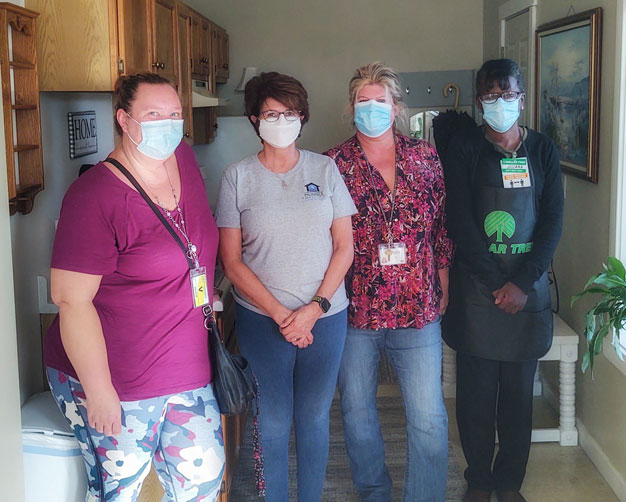
Humility Homes and Services staff and a leader of another nonprofit pose with Julia, a participant in HHSI’s permanent supportive housing program. A $100,000 grant to HHSI will help secure spaces for new participants coming to the program.
By Barb Arland-Fye
The Catholic Messenger
DAVENPORT — Humility Homes and Services Inc. has received a $100,000 grant for a pilot project to eliminate the need for a winter shelter within five years. The funding ensures that 10 individuals who struggle with chronic homelessness will have housing for the next three years and that the agency can serve additional individuals who have lower barriers to affordable housing.
Quad Cities Community Foundation awarded the grant to Humility Homes and Services (HHSI), one of two $100,000 Transformation Grants that the agency announced Jan. 13 to bring equitable solutions to the bi-state region. Two Illinois school districts — East Moline and United Township — will share the second grant in a collaborative effort to ensure quality WI-FI in students’ homes.
“The past year has shed light on the racial and socioeconomic issues of our country,” Sherry Ristau, the foundation’s president and CEO said. The grants “are part of our commitment to building a just, inclusive and equitable community.”
“We are very excited for this grant,” said Ashley Velez, executive director of HHSI. Finding equitable housing solutions benefits individuals and the community in the short and long term and working with partners helps to remove barriers to permanent housing, she added.
Among those partners is the Quad Cities Housing Cluster, which has developed and begun to implement the Quad Cities Vision for Affordable Housing. Within that initiative, HHSI facilitated development of a five-year plan to eliminate the need for a winter shelter in the Quad Cities, said Ryan Bobst, Strategic Initiatives and Grants manager for HHSI.
The collaboration of the cluster’s partners impressed representatives of the Quad Cities Community Foundation. An effort focused on people experiencing chronic homelessness can make a big difference in contributing to achievement of the vision for affordable housing, said Kelly Thompson, the foundation’s vice president of grant making and community initiatives. “Humility’s planned approach to serving participants is effective and provides dignity. This grant will let them demonstrate success with a small group, allowing them to secure greater funding for the future.”
The winter shelter, which HHSI operates with the Scott County Housing Council, serves around 400 individuals during winter months. So far this winter, 144 individuals have utilized the winter shelter, Bobst said. “Winter shelter participants generally fall into three categories — those with low barriers to housing, those with high barriers to housing, and those experiencing chronic homelessness. Diversion funds can often help house those with low barriers to housing — perhaps paying for a deposit or first month’s rent as a person starts a new job. Street outreach and supportive services are layered on for individuals with high barriers to housing — perhaps helping arrange transportation to medical appointments and connecting individuals to services that meet their needs.”
“Finally, individuals with chronic homelessness need extensive case management and supportive housing — this is where the Transformation Grant really came together. By housing some of the highest utilizers of our system, we can benefit the individuals by providing supportive housing, and also make room for other individuals in need of less intensive services,” Bobst said.
The 10 individuals chosen for the pilot project experience the most barriers to housing. “All experience chronic homelessness; they have an average of 1,398 days of homelessness or just less than 4 years living outside. They all have at least one arrest in their history, with the average individual having been arrested eight times for crimes like trespassing.”
Each individual also has a behavioral health diagnosis and has accessed the emergency department for behavioral healthcare needs. HHSI will use the grant money to pay for rent/utilities, case management services and stability funds for these individuals. The proactive measures open up opportunities to serve others with lower barriers to housing, Bobst said.
The pilot project should be cost-effective, as well. “Based on the Corporation for Supportive Housing’s national cost-avoidance research, it is estimated that these individuals would cost non-housing systems (jails, police departments, hospital systems, and emergency shelters) nearly $1.8 million over the same three-year time period. This cost will be avoided because individuals will be engaged in supportive housing,” Bobst said.
While affordable housing and rental assistance are critical components of HHSI’s services, “our staff provide intensive case management that helps individuals cement their stability and maintain permanent housing,” Bobst said. “Intensive case management includes daily living skills, connection to needed services, transportation, employment search/assistance, and relationship/connection to the community. This is the beginning of a pilot project to demonstrate the localized success of supportive housing and the benefits it brings both to individuals and the community.”











